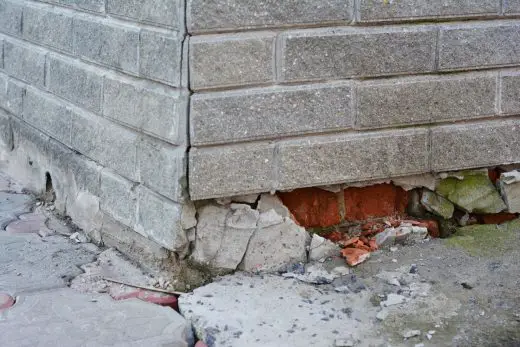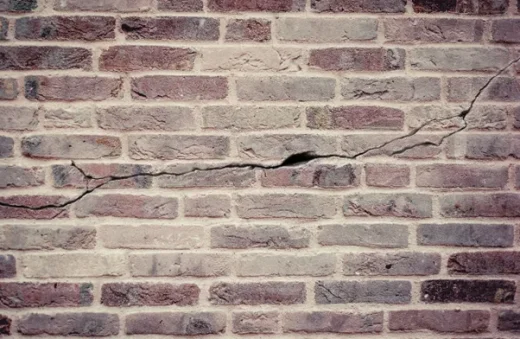Cracked foundation repair, Home waterproofing restoration, Property maintenance
Who To Call When You Have A Cracked Foundation?
November 1, 2024
Recognizing a cracked foundation for what it is – a serious threat to the structural integrity of your home – can be daunting. If you are observing signs like uneven floors, wall cracks, or jammed doors, your home might be crying out for help.
A professional diagnosis is fundamental at this point. Pacific Waterproofing and Restoration offers expert evaluation and suitable repair solutions to rectify damaged house foundations swiftly.
The secret to mitigating serious damage lies in early detection and immediate action. When dealing with a cracked foundation, trust only the specialists who have the knowledge and experience necessary to safeguard your home.
Understanding Foundation Cracks
Foundation cracks may seem daunting, but understanding their types and severity can alleviate your worries. You can identify potential causes and plan for repairs.
Barely noticeable hairline cracks are common in concrete foundations. They usually don’t imply severe foundational issues and can be resolved with minor fixes.
If you spot larger, horizontal cracks, this suggests serious issues. It’s crucial to call a professional as these cracks imply structural damage from water pressure or shifting soil.
Crack measurement:
-
- A crucial step is estimating the width, length, and depth of the crack. Smaller cracks might not require immediate attention.
Professional consultation: Consider seeking advice from foundation repair experts or structural engineers for significant cracks.
Solution options: Depending on the severity and type, solutions range from epoxy injections to major overhauls like foundation replacement.
Regular monitoring: This can help detect worsening conditions early on. Use a crack monitor or take regular detailed photographs for comparison.
Keeping calm and tackling the issue systematically helps mitigate stress. Remember, swift action may prevent an inexpensive repair from becoming a costly overhaul.
To maintain your peace of mind regarding foundation cracks, timely consultation with professionals is highly advised. Remember, regular monitoring helps nip problems in the bud.
Common Causes of Cracks
Foundation cracks can occur due to a variety of reasons, some more common than others. They can result in substantial damage if not addressed promptly.
One of the main reasons for cracks is soil movement beneath your home’s foundation. Over time, these movements create pressure that can cause cracks.
Hydrostatic Pressure:
-
- This is often caused by excessive moisture in the clay soil surrounding your foundation. It exerts pressure on the walls leading to cracks.
Tree Roots: Some trees have extensive root systems that can invade your foundation space, causing cracks as they push against the concrete.
Poor Soil Compaction: If the soil beneath your house was not compacted properly during construction, it can settle over time, resulting in foundation cracks.
Freeze/Thaw Cycle: Repeated freezing and thawing of the ground around your home can cause it to expand and contract, leading to foundation cracks.
If you notice cracks in your home’s foundation, it is crucial to seek professional help immediately. They can accurately identify the cause and offer solutions.
Different problems require different solutions. Therefore, early detection and professional intervention will ensure that the issue does not escalate further, safeguarding your home’s structural integrity.
Identifying Crack Types
The key to dealing with a cracked foundation starts with identifying the type of crack. Various forms exist, each indicating a specific issue.
What are Vertical Cracks?
Vertical cracks run up and down or slightly diagonal. Less serious than other types, they typically result from settling or shrinking concrete.
How about Horizontal Cracks?
Horizontal cracks spread along the foundation wall. These cracks could signal severe problems like water pressure, soil pressure, or frost heaving.
What do Diagonal Cracks mean?
Diagonal cracks usually form on an angle across your wall. They often indicate differential settling when one area of the foundation settles more rapidly.
Who to call for Foundation Cracks?
For all these foundation cracks, reputable foundation repair companies are best suited to assess and repair the damage reliably and efficiently.
When to Worry About Cracks
Seeing cracks in your home’s foundation can be alarming. Your immediate worry might be that the structural integrity of your house is compromised.
Identify Non-Threatening Cracks
However, not all cracks are serious. Some are due to natural settling and pose no threat to your home’s overall stability.
Narrow vs Wide Cracks
The width of the crack often indicates seriousness. Hairline cracks aren’t usually a concern, but wider cracks may require professional assessment.
Professional Examination is Key
If a crack is wider than 1/16 inch or growing, call a specialist. They can determine whether it’s a structural issue.
Different Types of Cracks
Different types of cracks indicate varying issues. Horizontal cracks are generally more serious than vertical ones.
Contacting a Structural Engineer
When your foundation cracks, it’s crucial to seek professional help promptly. Your best first call should be to a structural engineer.
Assessing the Damage
A skilled engineer will carefully inspect your home, analyzing the extent and cause of the damage. They will then recommend an appropriate repair strategy.
During their assessment, they’ll observe every inch of your foundation, looking for any signs of weakness or failure that could bring harm to your home.
Solution Proposal
After identifying the problem, your engineer will provide a detailed plan tailored to your specific situation to rectify the damage and prevent recurrence.
You can then use this proposal when consulting with contractors – this is your blueprint for repairs.
Hiring Contractors
Once you have a solid solution proposal in hand, it’s time to find reputable contractors who can execute it. Seek out several quotes for comparison.
Engaging a contractor who understands and respects the engineer’s recommendations is vital. Satisfaction comes with the knowledge that your home is in safe hands.
Consulting with a Foundation Expert
When you notice a crack in your foundation, it’s time to consult an expert. This is not a DIY moment; your home’s stability is at stake.
Foundation professionals provide thorough assessments of the damage. They analyze the possible causes and propose tailored solutions to prevent further degradation.
Geotechnical Engineers:
-
- These experts assess the soil condition around your foundation and give recommendations for repair methods.
Structural Engineers: They examine the overall strength and durability of your building structure.
Foundation Repair Companies: These businesses have teams specially trained to fix foundation problems.
Building Code Officials: They ensure adherence to local building regulations during the repair process.
You must also consider obtaining multiple quotes from different professionals. This will help ensure you get a fair price for the needed work.
In the end, safeguarding your property value and ensuring home safety is paramount. Consult with an expert if you encounter any foundation issues.
Exploring Repair Solutions
When you notice a cracked foundation, your first call should be to a structural engineer. They specialize in assessing and diagnosing structural damage.
Structural Engineers
Structural engineers don’t have vested interest in selling repair services. They provide unbiased assessments. Which means they only recommend necessary fixes.
They’re extensively trained specifically for understanding the integrity of home structures including the foundation.
Foundation Repair Companies
Following an engineer’s assessment, contact foundation repair companies. These professionals can efficiently carry out the recommended fix.
Their expert knowledge extends to all types of foundation cracks – whether minor or severe – providing the proper remedy each time.
Determining Costs
The cost will vary based on your foundation’s condition and the extent of damage. It’s important to get several estimates for comparison.
Beware of low-ball offers. If a quote seems too good to be true, it likely is. Choose quality repair work over cost savings.
Preventive Maintenance Tips
When dealing with a cracked foundation, quick and proper actions are crucial. Timely inspection and repair can save you from expensive potential damages.
“Prevention is better than cure” holds true for house foundations too. Regular maintenance, like checking walls and floors for cracks, can prevent extensive damage.
Knowledge about your home’s soil will aid in reducing future cracks. The type of soil impacts how foundations absorb water and can cause movement.
Regular Inspection:
-
- Perform regular inspections on your home’s exterior and interior for any signs of cracks on the walls and floor.
Gutter System: Enable proper drainage by ensuring your gutter system is clear of debris and properly directed away from your home’s foundation.
Landscape Sloping: Landscaping should slope away from your house. This ensures that water run-off does not accumulate near your foundation causing excess moisture.
Soil Moisture Levels: Maintain even soil moisture around the house to prevent extreme expansion or contraction that may harm foundation stability.
Maintaining your home’s foundation is not a daunting task when you understand what to look out for. Regular inspections combined with occasional professional check-ups can prevent minor issues from becoming major disasters.
Spare some time to nurture the pillars of your home – it’s an investment that will pay off in the long run, maintaining the value, comfort, and safety of your home.
Cracked Foundations Final Takeaway
Handling a cracked foundation can be overwhelming, but understanding its causes helps. Determining the severity is key. By consulting with structural engineers and foundation experts, you’ll find appropriate repair solutions. Remember, preventive maintenance is key in forestalling such issues.
Comments on this guide to Cracked foundation repair, home waterproofing article are welcome.
Construction
Construction Posts
Identifying telltale signs of home foundation problems

Architects and Builders know about Formwork
Building a Pedestrian Bridge Construction
5 reasons to use steel in residential construction
Reasons To Consider Custom Home Construction
Buildings
Residential Architecture Articles
Comments / photos for the Cracked foundation repair, home waterproofing page welcome







